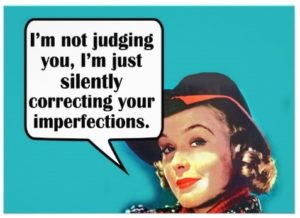 For the past 10 years or so, I’ve referred readers to a web page to get a brief description of the Knower/Judger (K/J) and Learner/Researcher (L/R) personas.
For the past 10 years or so, I’ve referred readers to a web page to get a brief description of the Knower/Judger (K/J) and Learner/Researcher (L/R) personas.
I thought I’d drop back a bit and give you my take on these “states of mind” that define the boundary between doing what we’ve always done (adhering to our DISC or Myers-Briggs or Kolbe profiles) and making a choice to do something else.
Somewhere in our history we made a decision that something was right or wrong, ethical or unethical, good or bad, trustworthy or not. We decided we knew what a good relationship looked like. We learned how to get what we want and maybe even if we could get what we want. If we grew up in a tumultuous household, we may have even internalized how often to beat our spouse or yell at our kids. If we grew up in a loving household, we became accustomed to hugs, healing hurts and sharing. All these standards and thousands more make up our Knower/Judger, that part of us that compares what’s going on with its rules of life, and finds it acceptable or unacceptable.
Since no two of us grew up under the same circumstances—even siblings experience birth order and other differences under the same roof—nor have accumulated the same life experiences, then, really, no two K/Js are alike. Each is, however, quite rigid in its knowledge, whether that knowledge serves its owner well or not.
For many of the most rigid “rules” we live our lives by, early life experiences are the most powerful author. Our parents pretty much define the largest underlying foundations of our rules, ethics, morals, relationship with authority, learning style and many more. As such, a great deal of one’s K/J today was written and carved in stone by the decisions we made at 4, 5, or 6 years old. How often have you said, “Wow, I just sounded like my dad?”
To be clear, I believe we mostly honor the traditions and culture given us by our parents and our early home life. And as we mature and go out into the world and discover that everybody doesn’t have the same “rules of life,” friction can sometimes result. When my “absolute” crosses swords with your “absolute,” we either battle to the death or one or both decides to compromise the outcome or agree to back away (at least one of us, right?). This becomes obvious in the case of newlyweds, two young people coming together to form a life—each coming from a different learning environment and bringing with them a different set of “life rules.” The bride’s home got to the dishes by the weekend, the groom’s washed them every night, etc., etc., etc., yada, yada, yada! Socks in the middle of the bedroom floor…
But we can also find ourselves in a new work environment with new co-workers, bosses, direct reports, etc. Same thing. At some point our K/Js will collide.
The question is: What do we do about it?
Switch on the Learner/Researcher persona. In my L/R, I set aside judgment and just take in data. I can safely doubt my understanding of a situation in order to better understand yours. For if I remain in my K/J, I will compare my knowledge with what you’re telling me and judge its correctness.
The biggest lesson here is that no learning takes place when I reactively stay in my K/J. Without allowing some space in my knowledge (by being in my L/R persona), everything will be compared to what I know.
A lot of absolutes reside within my K/J. Right and wrong. Good and bad. Valuable and worthless. Pretty and ugly.
If they don’t happen to match up with “the other person” in a relationship (even if in just a conversation), then the success of that relationship can be compromised. Sure, we match up on some things (GO CARDS!). Then again we might not. See what I’m saying? I can’t imagine someone not being a St. Louis Cardinals fan, but you’re out there, aren’t you?
It’s not terribly likely that favorite baseball teams will elevate to the level of making a relationship dysfunctional; but you can imagine different sets of “rules,” “prejudices,” or “absolutes” that neither person in a relationship can give up, can’t you? That’s their K/Js in operation—that space we live in when we’re auto-responding and reacting rather than choosing to set aside the “rules” long enough to create a space for non-judgmental exploration.
Why would I want to create that space? I’m right. He’s wrong. What’s there to discuss as long as he finally understands?
Therein lies the reason most of us stay in our K/J. Part of the “rules” of the K/J is to be “right.” We learned it from our parents, our teachers, our society. Being right is rewarded. Being right gets us praise. Being right gets us A’s on our report cards.
So the K/J, knowing all the “rules” is a “see, I’m right” manager. It’s important to us that we prevail.
The problem lies in the knowledge that this “win” is short term. It keeps me in my comfort zone. Keeps me safe, not having to challenge any of my rules.
That K/J need to be right can support some very dysfunctional concepts. Most of them start with “I can’t.”
Is there something you’ve been telling yourself you “can’t”? That’s your K/J keeping you in your comfort zone, and possibly from realizing a potential that you’ve convinced yourself is out of reach. It’s a “rule” for you.
What if you could doubt that rule? What if you could open your mind to new data that would support that you “can”?
It takes a choice to at least temporarily abandon the K/J rule and allow for other interpretations of the data. Switch on your L/R and possibly see a whole new world. It could be out there.

